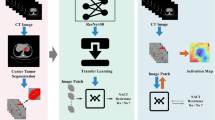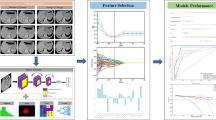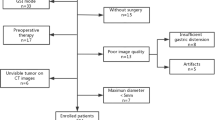Abstract
Objectives
Lymphovascular invasion (LVI) is a factor significantly impacting treatment and outcome of patients with gastric cancer (GC). We aimed to investigate prognostic aspects of a preoperative LVI prediction in GC using radiomics and deep transfer learning (DTL) from contrast-enhanced CT (CECT) imaging.
Methods
A total of 1062 GC patients (728 training and 334 testing) between Jan 2014 and Dec 2018 undergoing gastrectomy were retrospectively included. Based on CECT imaging, we built two gastric imaging (GI) markers, GI-marker-1 from radiomics and GI-marker-2 from DTL features, to decode LVI status. We then integrated demographics, clinical data, GI markers, radiologic interpretation, and biopsies into a Gastric Cancer Risk (GRISK) model for predicting LVI. The performance of GRISK model was tested and applied to predict survival outcomes in GC patients. Furthermore, the prognosis between LVI (+) and LVI (−) patients was compared in chemotherapy and non-chemotherapy cohorts, respectively.
Results
GI-marker-1 and GI-marker-2 yield similar performance in predicting LVI in training and testing dataset. The GRISK model yields the diagnostic performance with AUC of 0.755 (95% CI 0.719–0.790) and 0.725 (95% CI 0.669–0.781) in training and testing dataset. Patients with LVI (+) trend toward lower progression-free survival (PFS) and overall survival (OS). The difference of prognosis between LVI (+) and LVI (−) was more noticeable in non-chemotherapy than that in chemotherapy group.
Conclusion
Radiomics and deep transfer learning features on CECT demonstrate potential power for predicting LVI in GC patients. Prospective use of a GRISK model can help to optimize individualized treatment decisions and predict survival outcomes.





Similar content being viewed by others
References
F. Bray, J. Ferlay, I. Soerjomataram, R.L. Siegel, L.A. Torre, A. Jemal, Global cancer statistics 2018: GLOBOCAN estimates of incidence and mortality worldwide for 36 cancers in 185 countries, CA Cancer J Clin, 68 (2018) 394-424.
J. Lu, Y. Dai, J.W. Xie, J.B. Wang, J.X. Lin, Q.Y. Chen, L.L. Cao, M. Lin, R.H. Tu, C.H. Zheng, P. Li, C.M. Huang, Combination of lymphovascular invasion and the AJCC TNM staging system improves prediction of prognosis in N0 stage gastric cancer: results from a high-volume institution, BMC Cancer, 19 (2019) 216.
J.H. Lee, M.G. Kim, M.S. Jung, S.J. Kwon, Prognostic significance of lymphovascular invasion in node-negative gastric cancer, World J Surg, 39 (2015) 732-739.
B.J. Dicken, K. Graham, S.M. Hamilton, S. Andrews, R. Lai, J. Listgarten, G.S. Jhangri, L.D. Saunders, S. Damaraju, C. Cass, Lymphovascular invasion is associated with poor survival in gastric cancer: an application of gene-expression and tissue array techniques, Ann Surg, 243 (2006) 64-73.
P. Li, H.Q. He, C.M. Zhu, Y.H. Ling, W.M. Hu, X.K. Zhang, R.Z. Luo, J.P. Yun, D. Xie, Y.F. Li, M.Y. Cai, The prognostic significance of lymphovascular invasion in patients with resectable gastric cancer: a large retrospective study from Southern China, BMC Cancer, 15 (2015) 370.
M.S. Talamonti, S.P. Kim, K.A. Yao, J.D. Wayne, J. Feinglass, C.L. Bennett, S. Rao, Surgical outcomes of patients with gastric carcinoma: the importance of primary tumor location and microvessel invasion, Surgery, 134 (2003) 720–727; discussion 727–729.
S. Hirabayashi, S. Kosugi, Y. Isobe, A. Nashimoto, I. Oda, K. Hayashi, I. Miyashiro, S. Tsujitani, Y. Kodera, Y. Seto, H. Furukawa, H. Ono, S. Tanabe, M. Kaminishi, S. Nunobe, T. Fukagawa, R. Matsuo, T. Nagai, H. Katai, T. Wakai, K. Akazawa, Development and external validation of a nomogram for overall survival after curative resection in serosa-negative, locally advanced gastric cancer, Ann Oncol, 25 (2014) 1179-1184.
P. Lambin, R.T.H. Leijenaar, T.M. Deist, J. Peerlings, E.E.C. de Jong, J. van Timmeren, S. Sanduleanu, R. Larue, A.J.G. Even, A. Jochems, Y. van Wijk, H. Woodruff, J. van Soest, T. Lustberg, E. Roelofs, W. van Elmpt, A. Dekker, F.M. Mottaghy, J.E. Wildberger, S. Walsh, Radiomics: the bridge between medical imaging and personalized medicine, Nat Rev Clin Oncol, 14 (2017) 749-762.
W.L. Bi, A. Hosny, M.B. Schabath, M.L. Giger, N.J. Birkbak, A. Mehrtash, T. Allison, O. Arnaout, C. Abbosh, I.F. Dunn, R.H. Mak, R.M. Tamimi, C.M. Tempany, C. Swanton, U. Hoffmann, L.H. Schwartz, R.J. Gillies, R.Y. Huang, H. Aerts, Artificial intelligence in cancer imaging: Clinical challenges and applications, CA Cancer J Clin, 69 (2019) 127-157.
P. Godec, M. Pancur, N. Ilenic, A. Copar, M. Strazar, A. Erjavec, A. Pretnar, J. Demsar, A. Staric, M. Toplak, L. Zagar, J. Hartman, H. Wang, R. Bellazzi, U. Petrovic, S. Garagna, M. Zuccotti, D. Park, G. Shaulsky, B. Zupan, Democratized image analytics by visual programming through integration of deep models and small-scale machine learning, Nat Commun, 10 (2019) 4551.
W. Han, L. Qin, C. Bay, X. Chen, K. Yu, N. Miskin, A. Li, X. Xu, G. Young, Deep Transfer Learning and Radiomics Feature Prediction of Survival of Patients with High-Grade Gliomas, AJNR. American journal of neuroradiology, 41 (2020) 40-48.
M. Loey, G. Manogaran, N. Khalifa, A deep transfer learning model with classical data augmentation and CGAN to detect COVID-19 from chest CT radiography digital images, Neural computing & applications, (2020) 1–13.
F. Li, J. Chen, Z. Ge, Y. Wen, Y. Yue, M. Hayashida, A. Baggag, H. Bensmail, J. Song, Computational prediction and interpretation of both general and specific types of promoters in Escherichia coli by exploiting a stacked ensemble-learning framework, Briefings in bioinformatics, (2020).
F.T. Bosman, F. Carneiro, R.H. Hruban, N.D. Theise, WHO classification of tumours of the digestive system, 4th edn. Geneva:World Health Organization., (2010).
M.B. Amin, F.L. Greene, S.B. Edge, C.C. Compton, J.E. Gershenwald, R.K. Brookland, L. Meyer, D.M. Gress, D.R. Byrd, D.P. Winchester, The Eighth Edition AJCC Cancer Staging Manual: Continuing to build a bridge from a population-based to a more "personalized" approach to cancer staging, CA Cancer J Clin, 67 (2017) 93–99.
J.J. Van Griethuysen, A. Fedorov, C. Parmar, A. Hosny, N. Aucoin, V. Narayan, R.G. Beets-Tan, J.-C. Fillion-Robin, S. Pieper, H.J. Aerts, Computational radiomics system to decode the radiographic phenotype, Cancer research, 77 (2017) e104-e107.
W. Zhang, M. Fang, D. Dong, X. Wang, X. Ke, L. Zhang, C. Hu, L. Guo, X. Guan, J. Zhou, X. Shan, J. Tian, Development and validation of a CT-based radiomic nomogram for preoperative prediction of early recurrence in advanced gastric cancer, Radiother Oncol, 145 (2020) 13-20.
Q.X. Feng, C. Liu, L. Qi, S.W. Sun, Y. Song, G. Yang, Y.D. Zhang, X.S. Liu, An Intelligent Clinical Decision Support System for Preoperative Prediction of Lymph Node Metastasis in Gastric Cancer, J Am Coll Radiol, 16 (2019) 952-960.
Z. Ma, M. Fang, Y. Huang, L. He, X. Chen, C. Liang, X. Huang, Z. Cheng, D. Dong, C. Liang, J. Xie, J. Tian, Z. Liu, CT-based radiomics signature for differentiating Borrmann type IV gastric cancer from primary gastric lymphoma, Eur J Radiol, 91 (2017) 142-147.
Q. Sun, X. Lin, Y. Zhao, L. Li, K. Yan, D. Liang, D. Sun, Z.C. Li, Deep Learning vs. Radiomics for Predicting Axillary Lymph Node Metastasis of Breast Cancer Using Ultrasound Images: Don't Forget the Peritumoral Region, Front Oncol, 10 (2020) 53.
Y. Zhu, C. Man, L. Gong, D. Dong, X. Yu, S. Wang, M. Fang, S. Wang, X. Fang, X. Chen, J. Tian, A deep learning radiomics model for preoperative grading in meningioma, Eur J Radiol, 116 (2019) 128-134.
Z. Liu, B. Feng, C. Li, Y. Chen, Q. Chen, X. Li, J. Guan, X. Chen, E. Cui, R. Li, Z. Li, W. Long, Preoperative prediction of lymphovascular invasion in invasive breast cancer with dynamic contrast-enhanced-MRI-based radiomics, J Magn Reson Imaging, 50 (2019) 847-857.
A. Cucchetti, F. Piscaglia, A.D. Grigioni, M. Ravaioli, M. Cescon, M. Zanello, G.L. Grazi, R. Golfieri, W.F. Grigioni, A.D. Pinna, Preoperative prediction of hepatocellular carcinoma tumour grade and micro-vascular invasion by means of artificial neural network: a pilot study, J Hepatol, 52 (2010) 880-888.
J.H. Kim, Y.C. Lee, H. Kim, S.O. Yoon, H. Kim, Y.H. Youn, H. Park, S.I. Lee, S.H. Choi, S.H. Noh, Additive lymph node dissection may be necessary in minute submucosal cancer of the stomach after endoscopic resection, Ann Surg Oncol, 19 (2012) 779-785.
D. Mei, B. Zhao, J. Zhang, R. Luo, H. Lu, H. Xu, B. Huang, Impact of Lymphovascular Invasion on Survival Outcome in Patients With Gastric Cancer, Am J Clin Pathol, (2020).
L. Wu, Y. Liang, C. Zhang, X. Wang, X. Ding, C. Huang, H. Liang, Prognostic significance of lymphovascular infiltration in overall survival of gastric cancer patients after surgery with curative intent, Chin J Cancer Res, 31 (2019) 785-796.
B.J. Dicken, L.D. Saunders, G.S. Jhangri, C. de Gara, C. Cass, S. Andrews, S.M. Hamilton, Gastric cancer: Establishing predictors of biologic behavior with use of population-based data, Annals of Surgical Oncology, 11 (2004) 629-635.
H. Kim, J.H. Kim, J.C. Park, Y.C. Lee, S.H. Noh, H. Kim, Lymphovascular invasion is an important predictor of lymph node metastasis in endoscopically resected early gastric cancers, Oncol Rep, 25 (2011) 1589-1595.
Funding
This study is supported by the Key Social Development Program for the Ministry of Science and Technology of Jiangsu Province (BE2017756, YDZ).
Author information
Authors and Affiliations
Contributions
Conception and design: YDZ and XSL. Development of methodology: QL, QXF, CL, LQ, JZ, GY, YDZ, and XSL. Acquisition of data (acquired and managed patients, provided facilities, etc.): QL, QXF, CL, LQ, YDZ, and XSL. Analysis and interpretation of data (e.g., statistical analysis, biostatistics, computational analysis): QL, LQ, QXF, CL, JZ, GY, YDZ, and XSL. Writing, reviewing, and/or revision of the manuscript: QL and YDZ. Administrative, technical, or material support (i.e., reporting or organizing data, constructing databases): QL, LQ, QXF, CL, JZ, GY, YDZ, and XSL. Study supervision and guarantors: YDZ and XSL.
Corresponding authors
Ethics declarations
Conflict of interest
We declare that all authors have no financial and personal relationships with other people or organizations that can inappropriately influence our work, there is no professional or other personal interest of any nature or kind in any product, service and/or company that could be construed as influencing the position presented in, or the review of, the manuscript entitled “Prognostic Aspects of Lymphovascular Invasion in Localized Gastric Cancer: New Insights Into the Radiomics and Deep Transfer Learning from Contrast-Enhanced CT Imaging.” We declare that we had full access to all of the data in this study and take complete responsibility for the integrity of the data and the accuracy of the data analysis.
Additional information
Publisher's Note
Springer Nature remains neutral with regard to jurisdictional claims in published maps and institutional affiliations.
Supplementary Information
Below is the link to the electronic supplementary material.
Rights and permissions
About this article
Cite this article
Li, Q., Feng, QX., Qi, L. et al. Prognostic aspects of lymphovascular invasion in localized gastric cancer: new insights into the radiomics and deep transfer learning from contrast-enhanced CT imaging. Abdom Radiol 47, 496–507 (2022). https://doi.org/10.1007/s00261-021-03309-z
Received:
Revised:
Accepted:
Published:
Issue Date:
DOI: https://doi.org/10.1007/s00261-021-03309-z




